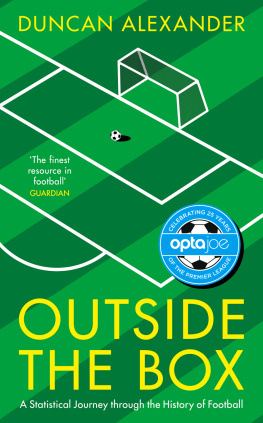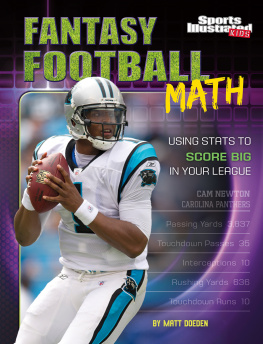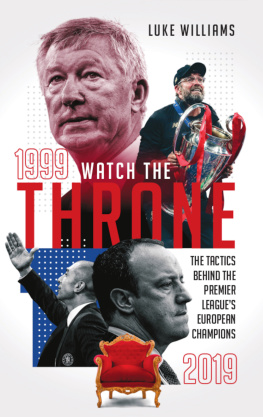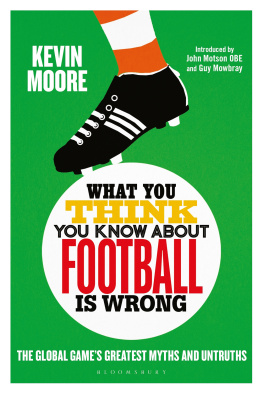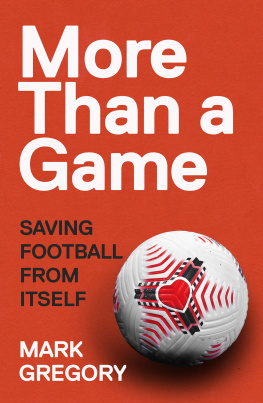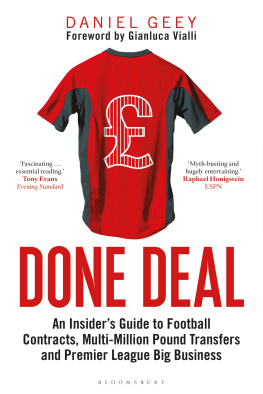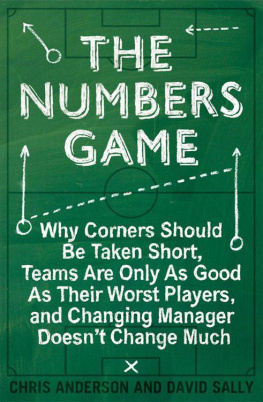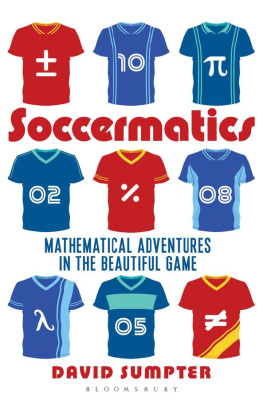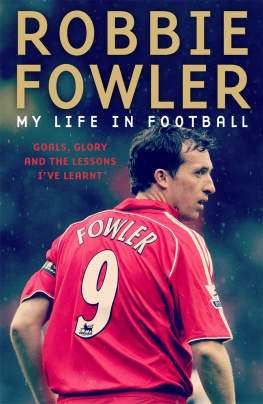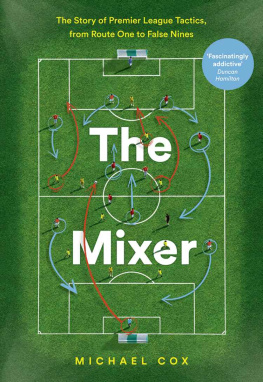This ebook is copyright material and must not be copied, reproduced, transferred, distributed, leased, licensed or publicly performed or used in any way except as specifically permitted in writing by the publishers, as allowed under the terms and conditions under which it was purchased or as strictly permitted by applicable copyright law. Any unauthorized distribution or use of this text may be a direct infringement of the authors and publishers rights and those responsible may be liable in law accordingly.
Epub ISBN: 9781473536777
Version 1.0
Published by Century 2017
1 3 5 7 9 10 8 6 4 2
Copyright Perform Media Channels Limited 2017
Cover: football Shutterstock, design by Natascha Nel
Duncan Alexander has asserted his right to be identified as the authors of this Work in accordance with the Copyright, Designs and Patents Act 1988
First published in Great Britain by Century in 2017
Century
The Penguin Random House Group Limited
20 Vauxhall Bridge Road, London, SW1V 2SA
www.penguin.co.uk
Century is part of the Penguin Random House group of companies whose addresses can be found at global.penguinrandomhouse.com
A CIP catalogue record for this book is available from the British Library
ISBN 9781780895611
To Big H and John
Introduction
When the Premier League launched in August 1992 no one was thinking of the 1966 World Cup. If youd mentioned England in August 1992 most people would have had sudden, upsetting memories of Graham Taylors team and their performance at the Euros earlier in the summer when it had quickly become apparent that Keith Curle and Andy Sinton were not the new Bobby Moore and Alan Ball.
You might ask: what is the significance of all this thrilling but diverting Euro 92 chat? Well, August 1992 was 26 years after Englands first and possibly only tournament win. We are now 25 years on from 1992, so images of Brian Deane and Alan Shearer and Preki are almost as old to everyone in Brexit Britain as Geoff Hurst and Jack Charlton were in the world of John Majors cones hotline.
Essentially, a lot of time has passed since the Premier League came into being and yet in many ways it doesnt seem that way. Created as a sort of hermetically sealed entity, albeit one that sanctioned relegation of its members to the Football League, the Premier League has now enjoyed 25 seasons of thrills, excitement and, naturally, a certain amount of tedium in what generally seems like an ever-developing rollercoaster of sports content.
The Premier League era is a phrase that enrages many football supporters, as they infer that this means everything that happened before 1992 is worthless preamble, when it clearly isnt. Towards the end of 201617, Cristiano Ronaldo homed in on another record, this time Jimmy Greavess total of 366 league goals in the top European leagues. For 1992-deniers, this was a huge blow because it showed that, where data is available and relevant, people have precisely no qualms about referring to a (wonderful) goalscorer from a different era.
Nevertheless, there is beauty in neatness, and 25 years of the Premier League is an apt point at which to pause and examine the quarter-century history of the competition. 1992 was a watershed year in the game, with the introduction of the back-pass rule shaping the modern game more significantly than any new league or organisation ever could. Not even Pep Guardiola would bother looking for goalkeepers with exceptional footballing (in the literal sense) ability if the last line of defence could still just pick the ball up.
If you work with numbers then youre naturally going to gravitate towards competitions and eras for which the most data exists, and 1992 onwards is, like it or not, that point in English league football. Its not an easy process either. For instance, the only reason that there now exists assists data for every player in Premier League history is because, a few years ago, a devout colleague of mine hunted down and ordered VHS end-of-season reviews for every top-flight club between 1992 and 1999 and filled in the gaps. Every single Swindon Town defeat, every terrible 10 Oldham win, all were dutifully added, later becoming part of the public discourse, as they should. When Cesc Fbregas reached 100 assists in the Premier League in 201617, it could only be wholly appreciated because of that meticulous work watching all those grainy club videos with their relentless and terrible guitar solo interludes.
Ultimately, football is nothing without history and the blessed context it provides, and in Outside the Box I have tried to weave my way through different parts of the games story, using numbers as the main but never the only ingredient. One fans stat is another fans fact is another fans myth. What every fan wants is information, be that on the last time their team did something worthwhile, or what their team might be doing to find the player who will alter the clubs fortunes. From the famous to the forgotten, from Upson to Downing, from Pel to Mal Donaghy, this book goes deep into the folds of the game.
1.
A Brief History of Data
The problems are solved, not by giving new information but by arranging what we have known since long
Ludwig Wittgenstein
The collection of data from human competition is not a recent creation. In the fiercely competitive world of the medieval tournament, an ambitious knights reputation grew from his ability roaming in the ferocious world of the melee and the subsequent ransoms he collected after capturing a (hopefully) wealthy opponent. But without people recording this data, how was a competitor to reliably demonstrate his success and skill? It should not be a surprise then that people in the 12th century did not differ much in their approach from those in the 19th or 21st, and opted to write things down. In the 1170s, Young King Henrys clerk Wigain recorded that William Marshal and another knight in Henrys household, Roger de Gaugi, captured 103 opposition knights in a 10-month period, truly the Messi and Neymar of medieval north-west Europe.
The rediscovery of a copy of LHistoire de Guillaume le Marchal in the late 19th century at around the time the Football League was formed in England was neat timing because this dusty but hugely important medieval document massively increased both our knowledge and understanding of tournaments precisely because it contained facts and figures, albeit written in verse, about Marshals stellar career. As Victorians devoured this 600-year-old information, a new association football competition was taking shape, for which more data was being recorded than ever before, data that is still being referred to and used (almost) every day in the 2010s.
The essential point is that we know a bit more about the glamorous tournament circuit in northern France in the 1170s than we do about football in the early part of the 19th century for one reason alone: we have more data. Football was wildly popular in England for much of the second millennium, with regular mentions of it by people from Shakespeare to Pepys, and yet a fog hangs over the actual competitors and their achievements. Its possible that the game was so frenetic and violent that even video footage of these seething rudimentary matches would be impossible to interpret and yet the fact remains that someone in 1723 (to pick a year at random) was the best player in the country, or the top scorer, or the best at shattering shins. Or all three. Well never be able to identify them but that shouldnt stop us saluting their hypothetical roughhouse achievement.

